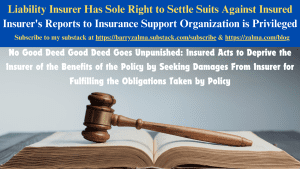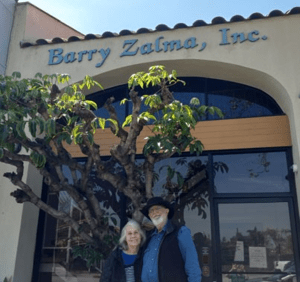Liability Insurer Has Sole Right to Settle Suits Against Insured

Post 4912
See full video at https://rumble.com/v5irxfh-liability-insurer-has-sole-right-to-settle-suits-against-insured.html and at https://youtu.be/-r9k6XFzWuc
Allstate Northbrook Indemnity Company (“Allstate”) moved for Judgment on the Pleadings. Plaintiff Zhiwei Chen (“Plaintiff”) opposed and Allstate filed a Reply. After considering the moving, opposing, and reply papers, and the arguments therein, in Zhiwei Chen v. Allstate Northbrook Indemnity Company, No. CV 24-5239-JFW(Ex), United States District Court, C.D. California (October 2, 2024) and the court resolved the motion.
FACTUAL BACKGROUND
On January 16, 2023, Plaintiff was delivering food for Uber when he was involved in an automobile accident. At the time of the accident, Allstate insured Plaintiff’s car under an automobile insurance policy. The Policy provided that Allstate “may settle any claim or suit if [Allstate] believe[s] it is proper.”
After the accident, a claim was made to Allstate against Plaintiff, and Allstate settled that claim. Plaintiff alleged that Allstate reported the claim/accident to LexisNexis, and that Allstate’s reporting of the claim/accident caused an increase in his premiums.
Plaintiff sued Allstate in Los Angeles Superior Court “LASC”), alleging claims for: (1) breach of contract; (2) breach of the implied duty of good faith and fair dealing; (3) insurance fraud; (4) defamation; and (5) intentional infliction of emotional distress. Allstate removed this action to the USDC.
MOTION FOR JUDGMENT ON THE PLEADINGS
Allstate argued that because the Policy gives Allstate the discretion to settle any claim that it believes is proper, Plaintiff cannot succeed on any of his claims
Federal Rule of Civil Procedure 12(c) governs motions for judgment on the pleadings. As with motions brought pursuant to Rule 12(b)(6), in addition to assuming the truth of the facts plead, the court must construe all reasonable inferences drawn from those facts in the nonmoving party’s favor.
THE POLICY GIVES ALLSTATE THE ABSOLUTE DISCRETION TO SETTLE ANY CLAIM
In this case, it is undisputed that the Policy provides that Allstate can “settle any claim or suit if we believe it is proper.” As a result, because Allstate has the contractual right to settle any claim, it cannot be liable under any cause of action alleged by Plaintiff for settling a claim.
The insured’s policy gave the insurer the right to settlement as it deemed expedient and since this type of clause is not unusual in liability insurance policies and is appropriate to the benefit of the insurer and the insured. As a result, an insurer normally cannot be liable to the insured if the insurer does no more than settle a claim or suit within the policy’s limits.
Because Allstate has the right to settle any claim it believes is proper, Plaintiff cannot maintain any cause of action based on Allstate’s exercise of its contractual right to settle the claim made against him.
ALLSTATE REPORTING OF PLAINTIFF’S CLAIM/ACCIDENT IS PRIVILEGED
In addition, Plaintiff cannot maintain a cause of action against Allstate based on Allstate’s reporting that Plaintiff was involved in an accident and that it settled the claim against him because Allstate’s reporting of Plaintiff’s claim/accident is privileged. Specifically, California Insurance Code §791.13 allows an insurer to report personal and privileged information to an “insurance-support organization” when necessary “to perform its function in connection with an insurance transaction involving an individual.” See Cal. Ins. Code §791.13(c)(1)(2).
Plaintiff bases his claim on the fact that Allstate reported information about Plaintiff’s claim/accident to LexisNexis. Plaintiff also alleges that LexisNexis disseminated that information to other insurers who “use[d] the information released by [Allstate] to judge [P]laintiff unfavorably” which led to Plaintiff paying “more for insurance than before.”
The USDC concluded that Allstate’s alleged reporting of Plaintiff’s claim/accident is privileged, and, as a result, cannot support a cause of action against Allstate.
All of Plaintiff’s claims alleged in the Complaint, including claims for breach of contract, breach of the implied duty of good faith and fair dealing, insurance fraud, defamation, and intentional infliction of emotional distress, were dismissed without leave to amend.
The USDC did away with this odd lawsuit without a need for oral argument because, if the Plaintiff tried to renew his Allstate policy it knew about the claim and if it applied to a different insurer he would be invariably asked to advise the new insurer about his accident history and would be required to disclose it himself. Settling claims against the Plaintiff was why he bought insurance from Allstate, he got what he paid for when they settled the claim, and they reported the claim to an insurance-support organization. The Plaintiff hoped by alleging bad faith he could bludgeon Allstate into paying him off. His attempt failed. In fact, the Plaintiffs actions were designed to deprive the insurer of the benefits of the contract fitting the definition of the tort of bad faith.
 (c) 2024 Barry Zalma & ClaimSchool, Inc.
(c) 2024 Barry Zalma & ClaimSchool, Inc.
Please tell your friends and colleagues about this blog and the videos and let them subscribe to the blog and the videos.
Subscribe to my substack at https://barryzalma.substack.com/subscribe
Go to X @bzalma; Go to Newsbreak.com https://www.newsbreak.com/@c/1653419?s=01; Go to Barry Zalma videos at Rumble.com at https://rumble.com/account/content?type=all; Go to Barry Zalma on YouTube- https://www.youtube.com/channel/UCysiZklEtxZsSF9DfC0Expg
Go to the Insurance Claims Library – https://lnkd.in/gwEYk
Like this:
Loading…



